During a recent date night with my husband, my beloved babysitter let my 4-year-old daughter take a few (unpublished) pictures with a Snapchat filter that added blush and eyelashes while smoothing out her already blemish-free skin. My daughter was transfixed, and started referring to those pictures as “the pretty ones.” My jaw instantly dropped, as did my heart.
“By age 4, children begin to compare themselves to others,” says Dr. Pam Roggeman, academic dean for the University of Phoenix College of Education. “There is now a new task added to the job of being a parent: teaching our kids to be critical viewers to help them develop an identity that is beyond their appearance.”
I’ve been ready for this task long before I became a parent, but I naively thought it wouldn’t become an issue so soon. When I wrote my first book, Body Drama, my goal was to educate teenagers about the plethora of airbrushed and digitally enhanced photos in magazines and on social media, and to warn them about how buying into the fakeness could be damaging to their self-esteem. This was revolutionary 10 years ago, back when only professional outlets had access to extremely expensive editing programs, and Photoshop was a well-kept secret weapon utilized by brands and businesses to sell aspirational products.
Today, the teen years are way too late to begin building awareness. Due to the availability of countless cheap and free editing services, selfie filters, and enhancing apps, harmful beauty standards are being baked into the social DNA of small children. In our extreme perfection-obsessed world, where everyone is expected to have thousands of friends and fans online while always looking like a movie star (at least online), teaching kids about media manipulation needs to begin around the time toilet-training ends.
Dr. Roggeman agrees that parents must help kids learn how to identify images that have been altered, and they must also have age-appropriate discussions about the messages being conveyed therein. Basically, preschoolers need to become experts at sniffing out Fake News, which abounds in imagery everywhere from Instagram to the school yearbook.
After all, we’re living in a time when elementary school portraits are offered with Photoshop enhancements, sometimes without even requiring parental permission. The expectation is that parents would prefer the “more attractive” version of their child, despite it being incorrect.
It’s not just young girls whose brains are being rewired this way, and the dangers of self-esteem issues brought on by social media and apps are not limited to beauty. When TODAY Parents editor Rebecca Dube let her 8-year-old use a coloring app called Recolor, he figured out how to post his pictures on a public board to get “likes.” Soon, “he was refreshing the page and cheering when his like counter clicked up, and comparing other pictures to his — ‘why did this get more likes than mine?'” Dube’s initial impulse was to ban the Recolor app, which fits into an approach that many teenagers are voluntarily taking, claiming to permanently log off of Instagram, Facebook, and Snapchat.
– Nancy Redd
Read more: How to Give Kids Good Body Image in the Age of Snapchat
Image Source: Pixabay








Leave A Comment